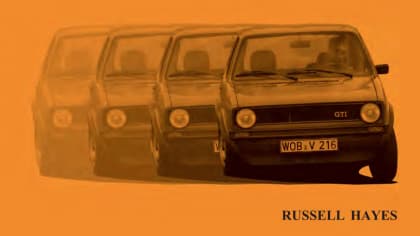STRIKINGLY TRUE
Ripley’s Believe It or Not!
This article is from our archives and has not been updated and integrated with our "new" site yet... Even so, it's still awesome - so keep reading!
Published on Mon, Nov 7, 2011
By: The LACar Editorial Staff

Dear LA Car,
$1,500 fiberglass coffins in the shapes of classic cars. A 24-carat gold and platinum Bugatti Veyron with a large, flawless diamond on the front grille. A road car that can convert into an airplane in just 30 seconds. It’s Strikingly True—and it’s Ripley’s Believe It or Not that car lovers will love.
Switch gears and cruise through these amazing automobile stories that are sure to rev your engine, featured in the new book from Ripley's Believe It or Not! called Strikingly True. The book is an annual collection of unusual, unbelievable and amazing stories from around the world.
Some of the book's crazy car stories include:
• Car Coffins - pg. 242 - Automobile fan Danny Mendez of Winchester, California, has designed a range of $1,500 fiberglass coffins in the shapes of classic cars. Each Cruisin' Casket features motorcycle headlights, alloy wheels from golf carts and extending side exhausts that serve as handles for pallbearers. In the absence of a death in the family, the coffins can also double as ice coolers.
• Beatlemania - pg. 131 - Art teacher Rebecca Bass and her students in Houston, Texas, won "Best of Show" at the 2010 Houston Art Car Festival with this dazzling vehicular tribute to the music of The Beatles. Each extravagant decoration is inspired by lyrics from Beatles songs. Ripley's soon snapped up the car, named Lucy in the Sky with Diamonds.
• Bullion Bugatti - pg. 135 - Made from solid 24-carat gold and platinum and featuring a large, flawless diamond on the front grille, the Bugatti Veyron Diamond must be the most expensive toy car ever made. It may be only toy-size, weighing 15 lb and measuring 10 inches in length, but it costs a cool $2 million to buy - that's almost twice as expensive as a real, regular-size Bugatti Veyron! Jewelry designer Stuart Hughes from Liverpool, England, and Swiss model expert Robert Gulpen spent two months creating this intricate replica, which also features functional steering and a detailed engine.
• Flying Car - 136 - A company from Massachusetts has devised a road car that can convert into an airplane in just 30 seconds. The Terrafugia Transition, which has four wheels, two folding wings, and a propeller at the rear, can reach speeds of 80 mph on the ground and 115 mph in the air. It can be stored in a conventional garage yet has a flight range of more than 490 miles.
• Hot Chocolate - pg. 190 - In 2009, scientists at Warwick University, England, unveiled an environmentally friendly racing car, built partly from vegetables and powered by chocolate. The bodywork of the WorldFirst car is made from plastic bottles and scraps from airplanes, the seat from flax and soy, and the steering wheel from the waste of juiced carrots. The car, which can reach speeds of 135 mph, uses plant-oil based lubricants and can run on biodiesel made from chocolate factory waste and stale wine.
• Electric Bullet - pg. 141 - In August 2010, the Buckeye Bullet 2.5, an electric car designed by a team of students from Ohio State University, clocked an average speed of 307.7 mph on Utah's Bonneville Salt Flats. The Bullet is powered by nearly 1,600 compact lithium-ion batteries, the kind that power laptops.
• Monster Limo - pg. 140 - The Midnight Rider, a giant tractor-trailer limo, is 70 ft long, 13 ft 8 in high, has 22 wheels, weighs about 50,650 lb and has room for 40 passengers. Owned by Pamela Bartholomew Machado from California, the monster vehicle, which costs $1,000 an hour to hire, boasts three lounges, a bar and a bathroom. To refuel it with a full tank of gas costs about $700 and a full oil change costs around $1,000.
• Horse-Drawn Hummer - pg. 140 - Jeremy Dean of New York City spent $15,000 on his Hummer H2 sport utility vehicle, and then turned it into a horse-drawn carriage.
• Fake Porsche - pg. 142 - Austrian artist Hanes Langeder spent six months building a life-size Porsche sports car from plastic pipes, tape and cardboard. The aluminum-foil-covered Ferdinand GT3-RS has no engine, but is powered by a hidden bicycle, which is why it has handlebars instead of a steering wheel.
• Versatile Vehicle - P. 142 - Dave March of the Californian company WaterCar has created the Python, a $220,000 amphibious supercar that can reach speeds of 125 mph on land and 60 mph - faster than many speedboats - on water. All the driver has to do before entering the water is put the gears into neutral, engage the jet drive, then push a button to raise the wheels.
Strikingly True has this and more in a new collection of the type of Ripley’s stories we all know and love.
Very truly yours,
Frank Wolff
Wellons Communications
For Amazon information on Strikingly True, click here





